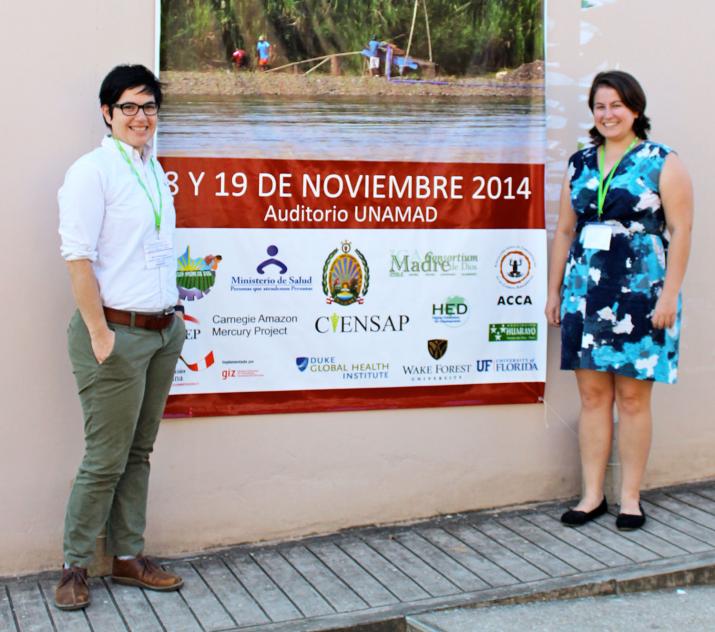
Beth Feingold (left) and Sarah Diringer at the mercury and public health forum in Madre de Dios
Published December 16, 2014 under Research News
Global Health Doctoral Scholar Sarah Diringer recently presented her work on the environmental impact of mercury at “Investigation Forum: Mercury and Public Health in Madre de Dios” in Madre de Dios, a region in the Amazon rainforest of Peru. Hosted by the Amazon National University of Madre de Dios, the event was coordinated by an organizing committee that included representatives from the Duke Global Health Institute (DGHI).
The goal of the forum was to disseminate current research about mercury contamination in the region with scientists, government officials, healthcare workers and other community stakeholders and explore implications of the research findings on local public policy and practice.
“The conference provided an all too rare opportunity in a volatile region to share work with other scientists in the presence of community members and stakeholders,” said Diringer. “It was an incredible experience to participate in the scientific discussion and learn from communities and local officials about strategies for improving the problem.”
Mercury and Artisanal Gold Mining
In the Madre de Dios region, mercury is used in the process of artisanal gold mining, resulting in potentially detrimental environmental and health outcomes for local residents, such as neurological issues, decreased cognitive functioning and kidney problems.
Diringer and other DGHI researchers, including William Pan, assistant professor of global environmental health at Duke’s Nicholas School of the Environment and DGHI, and Ernesto Ortiz, research analyst, are currently studying mercury contamination in the Madre de Dios/Beni watershed and the health impact of human mercury exposure.
Diringer’s Research Reveals Far-Reaching Contamination
Diringer presented results from a recent study in which she and her research team collected and analyzed samples from fish and water from the Madre de Dios River and its major tributaries to assess mercury levels in the river. In this study, the first of its kind, the researchers found that even communities located hundreds of kilometers away from the mining activity are at risk of dangerous mercury exposure through fish consumption.
Diringer is a PhD student in Civil and Environmental Engineering at the Pratt School of Engineering, advised by Heileen Hsu-Kim, associate professor. Hsu-Kim is a co-author on this study.
Former DGHI postdoctoral associate Beth Feingold also presented research study results.
DGHI Engaged in Several Mercury Studies
Pan is currently leading three studies related to the effects of mercury contamination in Madre de Dios:
- Exposure to emerging pathogens and heavy metals in the Madre de Dios River Watershed
- Migration, health, and the environment along the Interoceanic Highway
- Impacts on human health and the environment from resource extraction in the Amarakaeri Reserve


